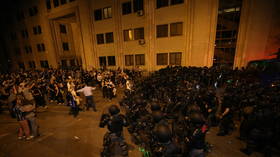
Law enforcement has deployed water cannons and used pepper spray against demonstrators outside the country’s parliament

Protestors clash with the police as they block the exists of the parliament building in Tbilisi, Georgia on April 30, 2024. © Getty Images / Anadolu / Davit Kachkachishvili
Georgian police late on Monday moved in to disperse protestors blocking the country’s parliament in Tbilisi, deploying water cannons, tear gas, and pepper spray against the crowds.
The unrest, which was triggered by a new attempt to pass a controversial “foreign agents” bill that is vehemently criticized by opposition lawmakers, has been ongoing for several days already.
Footage from the scene shows a large numbers of police officers clad in riot gear and equipped with shields and batons advancing on the retreating protesters. At least two water cannon trucks positioned behind the police can be seen repeatedly dousing the crowds.
Officers wearing gas masks were also seen pepper-spraying protesters, as well as apparently deploying tear gas to disperse the crowd. A number of protesters who had been affected by the substances appeared to have received treatment from paramedics at the scene, yet it was not immediately clear whether any of them had received serious injuries.
The most rowdy protesters were seen dismantling police barricades and pelting law enforcement with various projectiles, while scuffles repeatedly erupted near the parliament building. The decision to disperse the protest was prompted by attempts on the part of demonstrators to block the entrances to the building, the police explained in a statement.
The unrest in Georgia began earlier this month when the ruling Georgian Dream party launched a new attempt to pass the controversial “foreign agents” legislation, officially known as the bill ‘On the Transparency of Foreign Influence.’ Thus far, the bill has passed in the first reading, while the second reading is scheduled for Wednesday.
The legislation is a new version of a similar bill first tabled by the ruling party in March 2023 that only made it through the first reading before being shelved following riots in Tbilisi. The legislation would have required organizations and individuals with more than 20% foreign funding to register as ‘agents of foreign influence’ and disclose their donors.
The new edition has received only minor tweaks, with the designation of ‘agents of foreign influence’ being replaced with ‘an organization facilitating the interests of a foreign power,’ while the funding disclosure clause remained in place.




